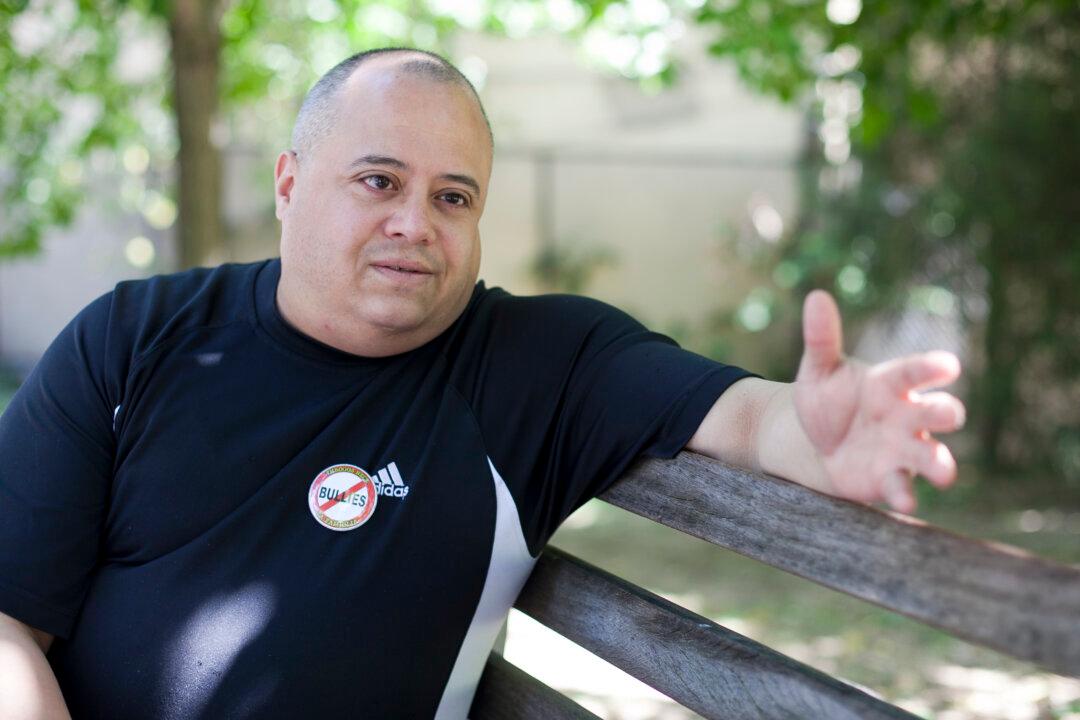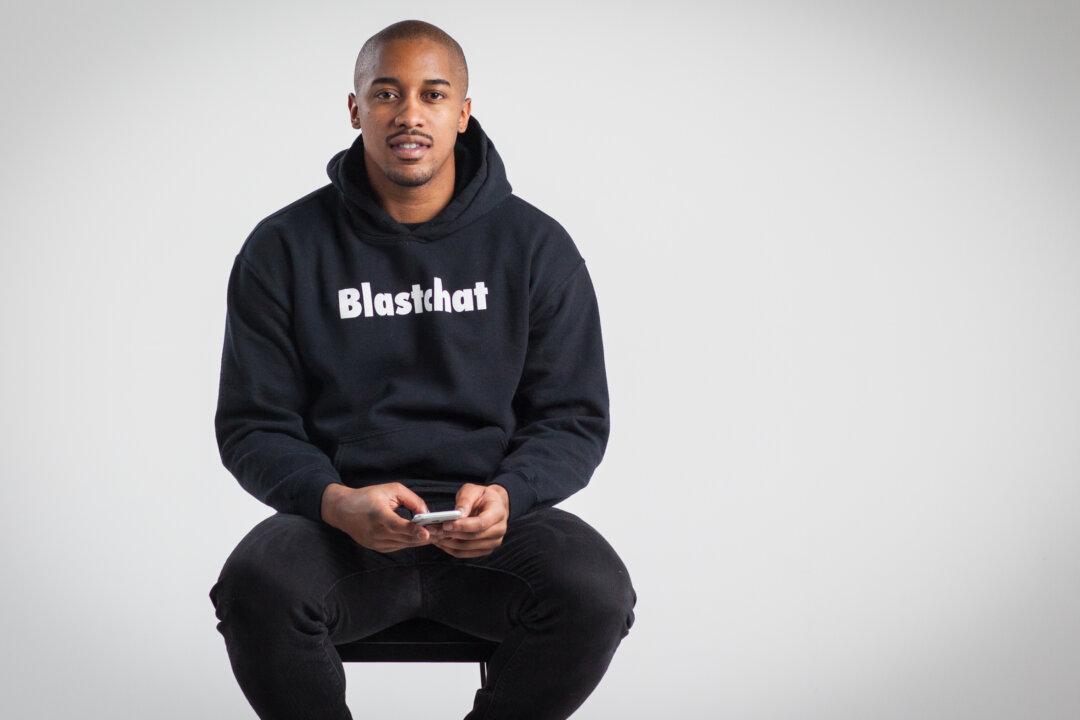NEW YORK—Former drug lord and Rikers Island Latin Kings gang founder, Christian Claudio, struggled to suppress his tears as he spoke on the phone with a 12-year-old Ukrainian boy living in Middletown, New York.
The boy was no blood relation of his; they had never met.
But in many ways, Claudio felt that the boy was a mirror image of himself at the loneliest time of his life, his childhood.
And loneliness was why Claudio turned to violence in his youth. Loneliness was why he founded a gang in prison. Loneliness was why he became a drug lord.
After 15 years in prison, and some events that led to philosophical and spiritual revelations, Claudio, 48, now spends his time talking to lonely and bullied children.
The Ukrainian boy’s adoptive mother called Claudio a year and an half ago, describing how her son was experiencing a violent bullying situation at school. They later realized he had been contemplating suicide.
The boy was too small and too smart for his age, just like Claudio had been.
“That conversation broke me,” he said.
“I know how that feeling is, when all you want is a friend in school,” he said. “That’s a dark, dark place for a child.”
Being Bullied
Claudio grew up in Spanish Harlem, in the Carver Projects.
He had a strained relationship with his father. His father was was absent during most of his youth.
“I can’t remember him ever telling me happy birthday,” Claudio said.
His father worked as a waiter at the Metropolitan Opera from 2 p.m. to 11 p.m. Claudio describes him as a stern man; he was a member of the Rosicrucian religion.
As a child, Claudio had always been a small boy whom teachers described as gifted; he was a target for bullies throughout his childhood.
Claudio remembers the incident that drew the last straw. It had happened in middle school after a snowstorm.
“The big guys picked me up and threw me face first into the snow bank,” he recalled. “I went home crying with snow in my shirt and glasses, I was humiliated.”
“I could not understand what I was doing wrong, I just wanted a friend,” he said. “And after that, I made a conscious decision to never let that happen again.”
The first defense weapon he bought was nunchucks, inspired by the martial arts movies he watched. He soon realized they were illegal to carry around. So he bought a knife.
“I will always remember my first knife,” he said. “It was a Barlow knife. It was difficult to open and close and it did not have a lock.”
He bought a six-inch blade 007 knife next, “like the ones the big guys had.”
It all went downhill from there. There was no one to stop him.
Using the money he made from drug dealing, he would spend $20,000 every weekend at clubs.
For the 23-year-old Claudio and his entourage, their weekend began on Thursday.
He dropped out of Lehman College in his senior year, giving up accounting and a minor in early childhood education.
Instead, he ran a large drug network throughout New York and outer states.
Claudio was in and out of jail multiple times, but his main stretch was from age 26 to 41. He had been a suspect in numerous homicide investigations, and was sentenced to 37 years for conspiracy to commit murder in the second degree.
In prison, Claudio founded an offshoot of the Latin Kings gang on Rikers Island, where he controlled over 14,000 prisoners.
The Latin Kings was one of Chicago’s largest and most violent gangs that started in the 1940s. Claudio founded his gang in the New York City Department of Corrections, which led to its growth in New York state prisons.
Life in Prison
Claudio spent the majority of his incarceration at the Green Haven Correctional Facility, a maximum security New York state prison.
“I was in there with Ronald DeFeo Jr., the Amityville Horror murderer; Robert Chambers, the ‘Preppie Killer,’” he said. “But celebrities aren’t celebrities when they’re in there.”
He spent some time in other prisons as well, such as the Attica Correctional Facility.
On the third day after his arrival in Attica, a fellow inmate told him in an chilling tone to go against the wall in the courtyard.
“Then he said, ‘You feel that?’ I said this guy must be crazy, feel what? We were in the yard, there was no breeze, no nothing,” Claudio recalled.
The man was talking about the tension between the inmates.
A moment after he uttered those words, a man began to chase another prisoner with a weight bar. Pandemonium broke out. The inmates had orchestrated a coup to take over a Dominican drug dealer’s business in prison.
“They can make a couple hundred to a couple of thousands of dollars a week from within prison,” Claudio said. “People can support their families in prison from selling drugs.”
Despite his harsh world in prison, and all the crimes he had committed, Claudio found his innate moral consciousness after a series of events.
Following an incident in which he almost killed another inmate, Claudio began to reconsider his life choices. He didn’t want to add on any more years for murder.
What moved Claudio was another low moment in prison. As he was contemplating suicide, an officer took the time to talk to him.
“[He] took the time to talk to me as a human being, not as an officer,” Claudio recalled. “He gave me a little hope.”
Claudio’s family pursued a legal technicality, which led to the reversal of his conviction after 15 years in prison.
“Also, they released me because my life had changed around even while inside prison,” he said.
Claudio not only left the gang he created, but convinced others to leave too.
Leaving a gang is no easy task. It often leads to violent retaliation. But since Claudio had been a gang founder, he realized he could use the respect and connections he had to help certain members leave without repercussions.
He has convinced several Blood and Crips members to leave gangs, and even regional Blood leaders to leave.
Moments of Realization
“Although a part of my epiphany moment came in a prison cell, my moment came when my father passed away in ’88 from cancer,” he said.
He was visiting his father’s tombstone.
“I was doing some introspection, looking at my relationship with him, how I got to where I was at, and just wishing he was around to see the change,” he said. “I had put him through a lot.”
He recalled that there were very few people at the graveyard.
“I lost 15 years of my life that I can’t get back because I was in prison,” he said. “And I don’t want to be another tombstone with no one remembering me.”
“I did a lot of dirt. I didn’t want people to look at my picture and think, oh Chris was a low life parasite who sucked society dry. Those things were true for the time that I was doing them,” he said. “But I want someone else to come along, put a comma, and stick the word ‘but’ in there.”
“I want people to be able to say—but—now my child has a great job, is out of the gang ... because Chris took the time to speak to them,” he said. “So I get a piece of me that lives on through them.”
Helping Youth
Two and a half years ago, Claudio founded “Throggs Neck—La Famiglia,” a nonprofit that reaches out to troubled youth.
He now spends his time giving free presentations in schools, community events, and prisons. He also spends one-on-one time with young gang members.
He has told his story to thousands of kids and hundreds of active gang members, and has successfully convinced numerous gang members to leave.
When a gang member decides to leave, Claudio works closely with the family to make arrangements so that they can safely move to a new location without attracting attention.
He faces retaliation from time to time, but with the gang experience he has had, he always manages to get out of it in one piece.
“I do what I do now because I feel that that’s the reason why I went through what I did,” he said.
“Someone, somewhere, knew that I could endure this journey, to bring me to the point where I can be a voice to help these kids,” he said. “These kids will not listen to cops; they will not listen to the rhetoric of the politicians; they have to hear it from someone who has been there and done that.”
His cellphone number is posted publicly online. He can get up to 10 calls a week from concerned parents seeking help.
Although the organization originally focused on helping troubled youth in Throggs Neck, Bronx, he never rejects a cry for help. Parents from as far away as Middletown, New York call him for help.
The parents of the Ukrainian boy had family and friends in New york City, and would take him to visit Claudio regularly on weekends.
After a year and a half of weekend mentoring with Claudio, in addition to therapy, the boy is no longer suicidal and has even become friends with one of the bullies at school.
His organization receives some private funding. “It’s difficult to get grants,” he said. “I have never paid myself a salary.”
Claudio has a side job where he promotes events for restaurants and clubs. With his background, it is difficult to get hired for a full time position.
“Even though I’m not in jail anymore, I’m still suffering for what I did,” he said. “If I would have known how much it would cost me later, I would have never pulled that trigger.”
But things are turning around. Last month, the New York Gang Investigators Association certified Claudio a New York gang specialist.
He recently helped create a anti-bullying app called “Say No To Bullying” which provides a guide for parents with warning signs and misconceptions about gangs and bullying.
He has an “open-line policy” with the youth that he mentors. He keeps his cellphone on as late as 4 a.m. each night, just in case a lonely kid is in trouble and needs someone to talk to.
Christian Claudio
(347) 763-TNLF




